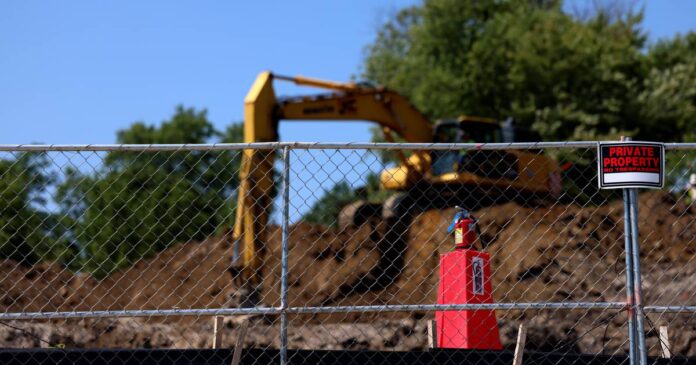Illinois Attorney General Kwame Raoul has ruled that the village of Winnetka did not violate the Open Meetings Act during discussions last year about properties owned by billionaire resident Justin Ishbia.
The challenge was filed by Winnetka resident Ted Wynnychenko after the Dec. 6, 2022, Village Council meeting where discussion was held about the consolidation of several plots of land owned by Ishbia and his wife Kristin. After an hour in closed session, the council voted unanimously to approve combining the four lots into a single 3.7-acre lot for the family to build a home.
“Both sides, the property owner and those objecting to the resolution, threatened the village with litigation in open session that night,” Village Attorney Peter Friedman said during the Aug. 1 council meeting in reference to Raoul’s ruling that was made earlier that day. “In an extended closed session, the board engaged in a productive and creative discussion on how to navigate the resolution in order to protect the village from litigation.”
Martin Sinclair, a lawyer for Winnetka resident Rob Schriesheim who had previously filed suit against the Winnetka Park District, spoke at the Dec. 6 meeting and threatened a lawsuit if the village approved the consolidation under the grounds of the Illinois Public Trust Doctrine.
Ishbia’s lawyer, Adam Hoeflich, also threatened suit saying the village must approve the consolidation as the applications are complete and there was no lawful basis to deny them.
Wynnychenko spoke at the Dec. 6 meeting as well, saying he had prepared comments but instead chose to rebut statements made by Hoeflich.
“I have no problem with the consolidation but I am troubled by their attempts to demarcate state land as private land,” Wynnychenko said. “Clearly, this council must approve this because otherwise there is going to be a lawsuit filed saying that you did the wrong thing. I feel that that threat was repeated so often that it was not even subtle.”
Friedman said the complaint alleged the Village Council didn’t have grounds to enter closed session and had strayed from the authorized topics and conducted illegal discussions during closed session. Probable or imminent litigation, such as those threatened against the Village Council twice that evening, is considered an authorized topic to be discussed in closed session, according to the Open Meetings Act.
“Needless to say, it is not everyday that the attorney general reviews closed session recordings and then finds entirely for the local government,” Friedman said. “That the PAC (public access counselor) did so here, while it was as we predicted, speaks volumes to the village’s commitment to complying with the Open Meetings Act even in the context of difficult and sensitive matters that come before the village.”
Village President Chris Rintz assured residents in December there would be continued discussions of the lakefront and how the village can regulate it.
“It’s easy to stand up at the podium and say all sorts of things but as an elected body we really are held to a higher standard than opinions offered in the microphone,” he said on Dec. 6. “We’re going to do the hard work. We’re going to find the right people. We’re going to bring them to the table and we hope that everybody in this room will join us for those conversations.”
The Village Council has gone forward with those conversations as promised where it learned of gaps in state and federal regulations stemming from the COVID-19 pandemic. It also learned village jurisdiction extends into the lake meaning the village can pick up the regulatory slack.
The Village Council approved ordinances to add regulations in March 2023 requiring permits from the village to build on the lakefront in addition to those required by the Metropolitan Water Reclamation District, Illinois Department of Natural Resources, Illinois Environmental Protection Agency and the U.S. Army Corps of Engineers.
Ishbia’s land, the homes on it and all the trees have since been bulldozed along with the bluff, causing the Village Council to suspend new construction on the bluffs and tableland 40 feet back for nine months while they look into the potential damage bluff construction can cause.
:quality(70)/cloudfront-us-east-1.images.arcpublishing.com/tronc/LIDCYYUF6VEELE47OSNPO4XP5Q.JPG)
The Dec. 6 meeting is just one of many examples of discontent in the village over Ishbia’s plans with continued discussion surrounding the destruction of the bluffs and removal of all trees on his property immediately south of Centennial Park.
Residents such as Mary Garrison and Vicki Apatoff, who travel along the waterfront, as is allowed by the Illinois Trust Doctrine, have been confronted by security when they reach Ishbia’s property line and told they are trespassing. The doctrine states the land under Lake Michigan is held in trust by the state for use by all residents and is not privately owned.
:quality(70)/cloudfront-us-east-1.images.arcpublishing.com/tronc/4CDXY45O6NEFVINA5SNS5CZ4HI.JPG)
When police are called, residents have been assured they are within their rights to travel along the beach as long as their feet are in the water and they don’t venture on to private property.
:quality(70)/cloudfront-us-east-1.images.arcpublishing.com/tronc/Z52XAJE2TVDG5IBZDKHFBN54IU.JPG)
Beyond the continued construction at the property, there is still unfinished business between Ishbia and the Winnetka Park District. A land swap signed in October 2020 would gift the land at 261 Sheridan Road, which Ishbia owns, to the Park District in an effort to combine Elder Lane and Centennial beaches. The Park District and Ishbia have both moved forward with separate construction plans but the Park Board has expressed hope that the two can work together to minimize the amount of construction needed to keep both public and private land preserved.



